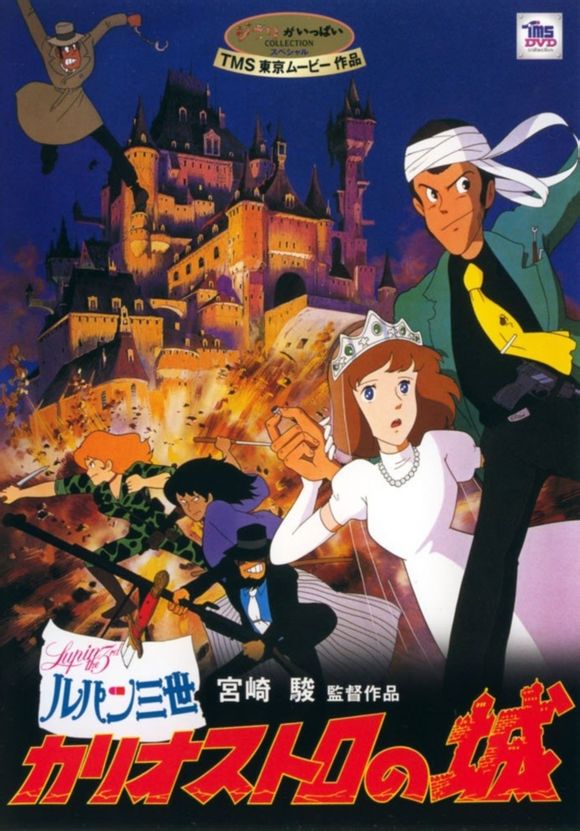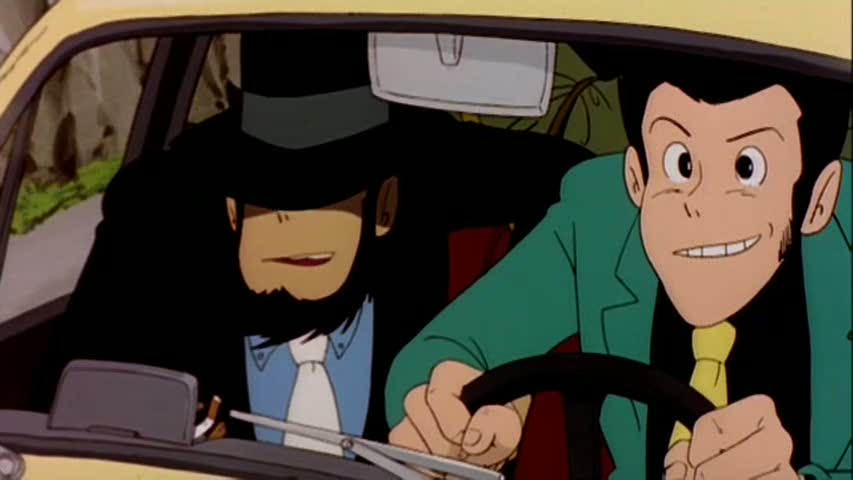Tim's Toons: 1979 and the first film of Hayao Miyazaki
 Saturday, May 9, 2015 at 8:06AM
Saturday, May 9, 2015 at 8:06AM  Tim here. May is 1979 Month at the Film Experience, and as far as animation goes, that was a pretty meager year (ardent fans of The Flintstones Meet Rockula and Frankenstone would no doubt disagree, but sadly, they do not exist). There was one clear highlight, though: 1979 was the year that a Japanese animator and TV director named Hayao Miyazaki made his first feature film. And 36 years later, he’s one of the only name-brand individuals in animation, anywhere in the world.
Tim here. May is 1979 Month at the Film Experience, and as far as animation goes, that was a pretty meager year (ardent fans of The Flintstones Meet Rockula and Frankenstone would no doubt disagree, but sadly, they do not exist). There was one clear highlight, though: 1979 was the year that a Japanese animator and TV director named Hayao Miyazaki made his first feature film. And 36 years later, he’s one of the only name-brand individuals in animation, anywhere in the world.
You wouldn’t necessarily be able to guess the full range of Miyazaki’s future career from Lupin III: The Castle of Cagliostro. For that is the title of this debut film, and if that whole “subtitle after the colon” thing makes it feel like it might have been part of an established franchise, that’s exactly the case. Lupin III was an anime series made by TMS Entertainment, adapting the adventures of a gentleman thief from French pulp literature; the first batch of episodes started to appear in 1971, and iterations of the animated franchise kept poking up for decades; the series still remains a cultural touchstone in Japan and it’s reasonably popular anywhere there’s an enthusiastic audience for classic anime.
The Castle of Cagliostro was the second feature starring Lupin III, after a few dozen television episodes, so it's not necessarily the place to look for a strong auteurist sensibility. Miyazaki was undoubtedly tapped in the first place because he’d already had experience co-directing some episodes of the first series, and could work in the already-established franchise rules. Transferring it to a contemporary context, and significantly recalibrating the financial stakes, and it’s tempting to compare Miyazaki’s first feature to the habit of Marvel Studios to hand its enormous and costly tentpoles to semi-prominent television directors. In both cases, it’s the very lack of a personalizing stamp that the company was hoping for.
They didn’t quite get it: by all accounts, the version of Lupin III that Miyazaki presented in this film is a much gentler, more humane soul than the standard incarnation of the character. And if there’s a single overriding characteristic of all Miyazaki’s films, it’s the director’s obvious, overwhelming affection for his characters and his desire to find the very best about them at all times and in all situations. Softening Lupin III from a callous playboy and thief is exactly the personal touch that we’d expect from the later Miyazaki, even if the requirements of the Continental thief genre make it difficult for many of his other characteristic touches to show up (his great skill at crafting female characters is nowhere in evidence, for example).

It’s not quite the clear foundation for a legendary career, then (the TV series that Miyazaki had led the previous year, Future Boy Conan, feels much more like his subsequent work than The Castle of Cagliostro ever comes close to doing). But even if it’s more a showcase for Miyazaki as a talented, impersonal journeyman, it still does a largely great job at that. This is still a generally strong comic adventure, one that finds the extravagant story - which starts with Lupin and his sidekick Jigen heading to the small country of Cagliostro, nestled in the European Alps on a hunt for counterfeit money, and proceeds to pile on complications and other characters at a hectic rate - presented with clarity and control that keep it from ever sprawling into chaos no matter how many twists it takes. And the characters are enjoyable company, although they’re never more complicated than basic comic stock types.

Visually, the film is hemmed in by its low budget. This is, for all intents and purposes, an ambitious TV production given a theatrical release, and it looks it. The backgrounds are gorgeous, for the most part, showing off the grandeur of an aging Europe of imposing mountains and playfully impossible castles that sprout parapets and extra wings in every direction, and there’s a distinctly Gothic sensibility to many individual scenes. But the characters are simple: basic lines, straightforward expressions that have the broadness of pantomime, solid chunks of color without any fussy detail that would make it hard to keep re-drawing it.
Overall, it’s a film that almost completely lacks for serious ambition. But even as just a frothy caper set in some marvelous locations, it’s awfully enjoyable. Miyazaki would almost immediately ramp up his artistic aspirations by geometric leaps and bounds: his next feature, five years later, was the extraordinary sci-fi fantasy Nausicaä of the Valley of the Wind, and from there the rest his history. But just because The Castle of Cagliostro stands out in his career as a particularly simple, shallow affair, that doesn’t make it any less charming. It lacks Miyazaki’s voice but it quite successfully shows off his skills, and that makes it more than worth a watch for its own merits, however humble.
 Asian cinema,
Asian cinema,  Hayao Miyazaki,
Hayao Miyazaki,  TV,
TV,  animated films
animated films 



Reader Comments (3)
OMG, I just LOVE this movie!
I even loved it as a brutally cut version with a former quite "bad" german dub.
Thankfully it was aviable 15 years later as the original movie with a way better dub, though of course tops the japanese original.
For me the movie has everything I love. Fun, action, even a little love, but the fun and action, mostly at the same time, especially.
Oh I could really gush the hell out of this, but I leave it here.
Just love love LOVE it! One of Myazaki's best.
"ardent fans of The Flintstones Meet Rockula and Frankenstone would no doubt disagree, but sadly, they do not exist"
Um, yes we do.
Hayao Miyazaki
Address
http://imgur.com/a/EcdZj